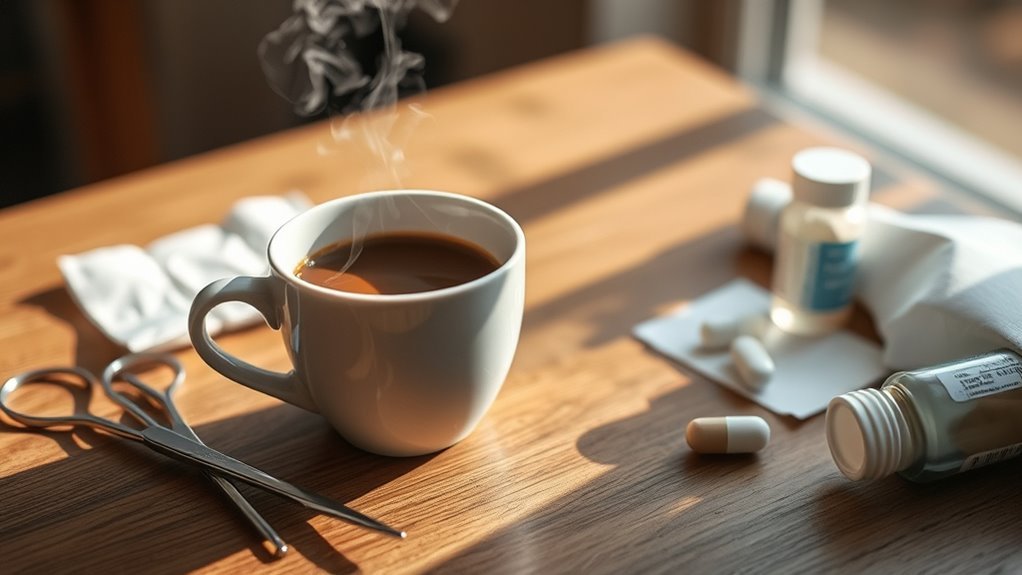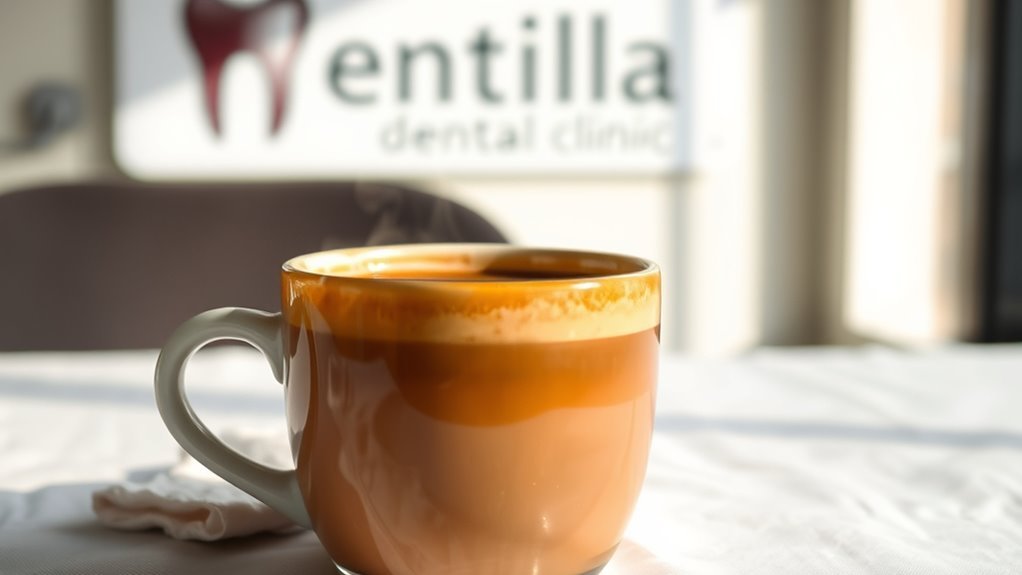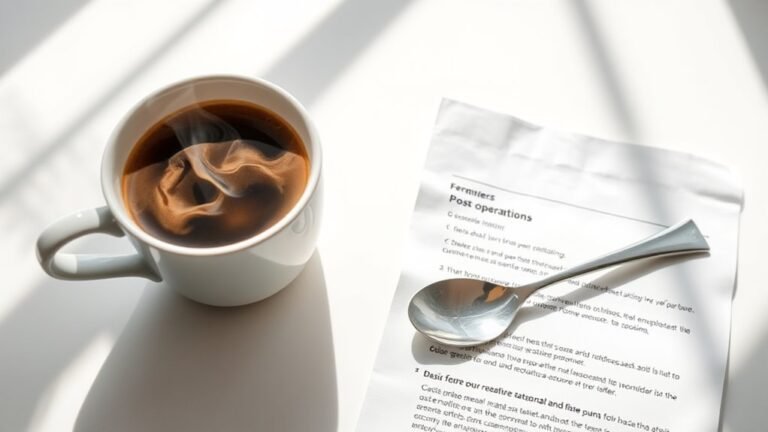Can You Drink Coffee After Wisdom Teeth Removal
After wisdom teeth removal, it’s best to avoid coffee for 48 to 72 hours. Caffeine can increase inflammation and pain, making recovery uncomfortable. It may also interfere with healing by affecting circulation. Instead, focus on soft foods and stay hydrated with water or decaffeinated options. Listening to your body’s signals is essential during this time. For a smoother recovery and tips on managing caffeine, other safe alternatives, and more, consider what follows.
Understanding Wisdom Teeth Removal

When you undergo wisdom teeth removal, it’s vital to understand the procedure and its implications for your recovery. Wisdom teeth, often the last molars to emerge, can cause crowding, infection, or pain when they don’t have enough space. This dental surgery typically involves anesthesia, extraction of the teeth, and possibly stitches. Your dentist or oral surgeon will assess your specific situation and may suggest removal even if you’re not currently experiencing issues. Knowing the potential for complications, such as dry socket, can help you prepare mentally and physically. Understanding the timeline and care required post-surgery can empower you to take control of your recovery and guarantee a smoother healing process, enabling you to return to your daily activities sooner.
The Healing Process After Surgery
As you recover from wisdom teeth removal, understanding the healing process is essential for a smooth recovery. Focusing on post-surgery nutrition and maintaining oral hygiene will help you heal effectively. Here are three key areas to prioritize:
Understanding the healing process after wisdom teeth removal is crucial for a smooth recovery and effective healing.
- Nutrition: Opt for soft foods like yogurt, smoothies, and mashed potatoes. These will aid in healing while minimizing discomfort.
- Hydration: Stay well-hydrated, but avoid straws for the first few days to prevent dislodging any blood clots.
- Oral Hygiene: Gently rinse your mouth with warm salt water after 24 hours to reduce the risk of infection, but avoid brushing the extraction site directly.
Effects of Caffeine on the Body

Caffeine can markedly impact your body, especially during the healing process after surgery. While it might provide a temporary boost in energy, it can also lead to dehydration, which is vital to avoid post-surgery. Understanding these effects is essential for your recovery and overall well-being.
Caffeine and Healing Process
While many people turn to coffee for its stimulating effects, it’s important to contemplate how caffeine can influence the healing process after wisdom teeth removal. Caffeine sensitivity varies from person to person, and your body’s response can impact your healing timeline. Here are three ways caffeine affects recovery:
- Inflammation: Caffeine may exacerbate inflammation, potentially prolonging discomfort.
- Blood Flow: Increased heart rate from caffeine can affect circulation, which is essential for healing tissues post-surgery.
- Pain Management: While caffeine can enhance pain relief medications, overconsumption might lead to increased sensitivity and discomfort.
Understanding these factors can help you make informed choices about caffeine intake during your recovery. It’s best to listen to your body and consult with your dentist for personalized advice.
Dehydration Risks Post-Surgery
Although many people enjoy coffee for its flavor and stimulating effects, it’s vital to recognize how it can contribute to dehydration, especially after wisdom teeth removal. Caffeine acts as a diuretic, which can exacerbate dehydration symptoms like dizziness and dry mouth. Post-surgery, your body needs adequate hydration to promote healing, so relying on coffee may not be the best choice. Instead, consider hydration strategies such as drinking water, herbal teas, or electrolyte-rich beverages. These options can not only keep you hydrated but also support your recovery process. Remember, staying well-hydrated is important for your overall health and recovery, so opt for fluids that replenish your body rather than those that could lead to further dehydration.
Pain Management and Recovery
After your wisdom teeth removal, managing pain effectively is essential for a smooth recovery. Utilizing appropriate pain relief techniques can greatly enhance your healing process. Here are three methods to evaluate:
- Over-the-Counter Medications: Non-prescription analgesics like ibuprofen can help reduce inflammation and alleviate pain.
- Cold Compresses: Applying a cold pack to your cheeks can minimize swelling and numb discomfort during the initial recovery phase.
- Rest and Hydration: Prioritizing rest and staying hydrated aids in your overall recovery timeline, allowing your body to heal properly.
Risks of Drinking Coffee Immediately After Surgery

Drinking coffee immediately after wisdom teeth removal can pose several risks that may complicate your recovery. The caffeine in coffee can heighten pain sensitivity, making your discomfort more pronounced during the healing process. Additionally, if you’re accustomed to consuming coffee regularly, the sudden cessation can lead to caffeine withdrawal symptoms, including headaches and irritability. These factors can hinder your ability to manage pain effectively and impact your overall recovery experience. Moreover, hot beverages might irritate your surgical sites, increasing your risk of complications like dry socket. To guarantee a smoother recovery, it’s best to avoid coffee for a period following your procedure, allowing your body to heal without added stress. Prioritize your well-being during this vital time.
Recommended Timeline for Resuming Coffee
Once you’ve had your wisdom teeth removed, it’s important to give your body adequate time to heal before resuming coffee consumption. Typically, it’s best to wait at least 48 to 72 hours post-surgery, but individual recovery may vary. When you’re ready to reintroduce coffee, consider the following:
After wisdom teeth removal, wait 48 to 72 hours before enjoying coffee again to ensure proper healing.
- Start with Decaf: If you have caffeine sensitivity, opt for decaffeinated coffee types initially.
- Monitor Your Response: Pay attention to any discomfort or sensitivity that might arise as you reintroduce caffeine.
- Gradually Increase Intake: If all goes well, slowly shift back to your preferred coffee types, appreciating your body’s cues.
Alternatives to Coffee During Recovery

During your recovery from wisdom teeth removal, you’ll want to contemplate alternatives to coffee that won’t irritate your healing gums. Herbal teas can provide a soothing option, while smoothies can be both nutritious and easy to consume. These choices can help you stay hydrated and energized without the risks associated with caffeine.
Herbal Tea Options
While you may be keen to enjoy your favorite coffee after wisdom teeth removal, herbal teas can serve as a soothing alternative during your recovery. Not only are they gentle on your healing gums, but they also offer calming properties that can help you relax. Here are three herbal tea options to contemplate:
- Chamomile: Known for its anti-inflammatory effects, chamomile can ease discomfort and promote relaxation.
- Peppermint: With its invigorating taste, peppermint tea can help soothe your stomach and alleviate nausea.
- Ginger: This herbal tea can aid digestion and has natural anti-inflammatory properties, making it a great choice post-surgery.
These herbal teas not only provide comfort but can also enhance your overall recovery experience.
Smoothie Recipes
If you’re looking for a delicious and nutritious alternative to coffee during your recovery from wisdom teeth removal, smoothies can be an excellent choice. Packed with beneficial smoothie ingredients, they’re easy to consume and digest. Consider blending bananas, yogurt, and spinach for a creamy, nutrient-dense option that supports healing. Alternatively, mix berries, almond milk, and a scoop of protein powder for a revitalizing boost.
Smoothie benefits include providing essential vitamins, minerals, and hydration, all vital for your recovery. Plus, they can help alleviate any discomfort from chewing solid foods. You can customize your smoothies according to your taste preferences, ensuring you enjoy a satisfying, nourishing drink that supports your body during this healing period.
Tips for a Smooth Recovery
After wisdom teeth removal, adhering to specific recovery tips can greatly enhance your healing process. To guarantee a smooth recovery, keep these dietary considerations in mind:
- Stick to Soft Foods: Consume mashed potatoes, yogurt, and smoothies to avoid irritating your extraction sites.
- Stay Hydrated: Drink plenty of water, but avoid using straws for the first few days to minimize the risk of dry sockets.
- Follow Your Recovery Timeline: Pay attention to your body’s healing phases, as swelling typically peaks around 48 hours post-surgery.
Listening to Your Body’s Signals

After your wisdom teeth removal, it’s essential to listen to your body’s signals regarding pain and discomfort. Pay attention to how your body reacts to caffeine and stay mindful of your hydration levels. Balancing these factors can greatly impact your recovery process.
Post-Procedure Discomfort Assessment
While you may be enthusiastic to return to your normal routine, it’s important to listen to your body’s signals following wisdom teeth removal. Post-surgery symptoms can vary, and a discomfort evaluation is vital for a smooth recovery. Here are three key points to keep in mind:
- Pain Level: Monitor your pain; mild discomfort is normal, but sharp pain may indicate complications.
- Swelling: Some swelling is expected, but excessive swelling or bruising could be a sign to consult your dentist.
- Bleeding: Light bleeding is common, but if it persists beyond a few hours, you should seek medical advice.
Hydration and Caffeine Balance
Although staying hydrated is essential for recovery, the role of caffeine, particularly from coffee, requires careful consideration after wisdom teeth removal. Listening to your body’s signals is vital. Implementing effective hydration strategies can help you gauge when it’s appropriate to reintroduce caffeine.
| Hydration Strategies | Caffeine Moderation | Tips for Listening to Your Body |
|---|---|---|
| Drink plenty of water | Limit coffee intake | Pay attention to discomfort |
| Opt for herbal teas | Choose decaf options | Notice energy fluctuations |
| Include broths | Delay caffeine | Monitor swelling |
| Eat water-rich foods | Avoid excess sugar | Stay aware of your hydration |
| Use electrolyte drinks | Balance with water | Adjust based on recovery needs |
Maintaining this balance can support your recovery and guarantee your well-being.
Consulting With Your Dentist or Oral Surgeon
Consulting with your dentist or oral surgeon is essential for understanding the specific guidelines you should follow post-surgery, especially regarding dietary choices like coffee consumption. Your oral health depends on adhering to professional advice tailored to your situation. Here are key points to discuss:
- Timing: Ask when it’s safe to reintroduce coffee into your diet.
- Temperature: Inquire if hot beverages could impact healing or cause discomfort.
- Caffeine Effects: Discuss how caffeine might affect your recovery, such as increased bleeding or hydration levels.
Frequently Asked Questions
Can I Have Iced Coffee Instead of Hot Coffee Post-Surgery?
You can certainly enjoy iced coffee instead of hot coffee after your surgery, but you should be cautious about the beverage temperature. Iced coffee is generally gentler on your healing gums compared to hot drinks, which can increase blood flow and possibly cause discomfort. Just make sure it’s not too cold, as extreme temperatures might also irritate your mouth. Always follow your dentist’s advice for the best recovery experience.
Will Coffee Affect My Blood Clot Formation After Surgery?
Drinking coffee after surgery can affect your blood clot formation, which is vital for proper healing. Caffeine can potentially interfere with your body’s ability to form clots, delaying recovery. It’s important to prioritize the importance of blood clots in the healing process. To guarantee the best recovery, it’s best to limit caffeine intake for a few days post-surgery. Always consult your healthcare provider for personalized advice regarding your specific situation.
How Long Does Caffeine Stay in the Body?
Caffeine typically stays in your body for about 3 to 7 hours, depending on various factors like your metabolism and tolerance. The liver metabolizes caffeine, and its effects can linger, leading to withdrawal symptoms if you suddenly stop consuming it. If you’re used to regular caffeine intake, you might experience headaches or fatigue when you cut back. It’s crucial to be mindful of your caffeine consumption and how it affects your body.
Can I Drink Decaf Coffee After Wisdom Teeth Removal?
You might be itching for that rich, warm decaf coffee after surgery, but hold on a sec! While decaf has its benefits, especially for post-surgery hydration, it’s best to wait a bit. Your mouth’s healing needs all the TLC it can get, and hot beverages might cause discomfort. So, sip on some cool water or herbal tea instead. Once you’re healed, you can enjoy that decaf bliss without a worry in the world!
Does Coffee Interfere With Pain Medication Effectiveness?
Coffee can affect pain management, especially if you’re sensitive to caffeine. It might not directly interfere with the effectiveness of pain medication, but caffeine can heighten your sensitivity to pain if overconsumed. If you’re relying on pain medication, it’s wise to monitor your caffeine intake. Balancing your coffee consumption while managing pain can help guarantee you feel more comfortable during recovery. Always consult your healthcare provider for personalized advice on your specific situation.






